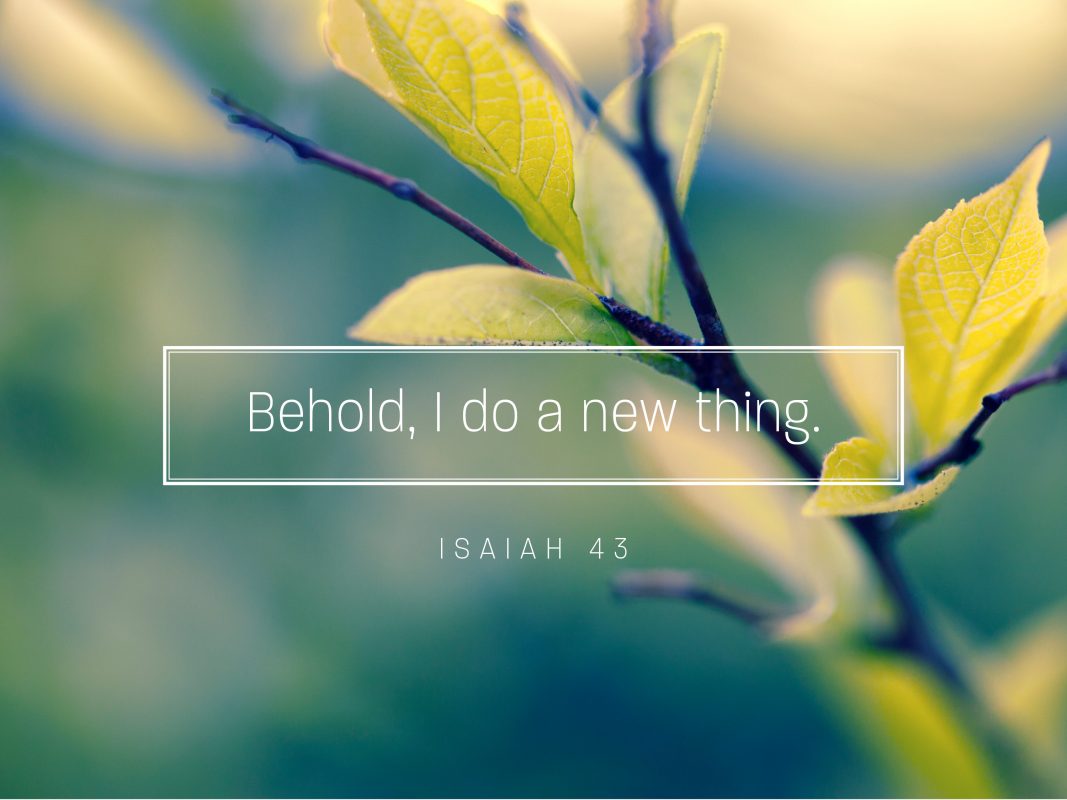In the annals of Christian scripture, the phrase “Behold, I will do a new thing” resonates profoundly within the hearts and minds of believers. This promise of renewal, as articulated in the Book of Isaiah, not only encapsulates the divine assurance found throughout the biblical narrative, but also reflects an enduring theme of transformation and rebirth. This essay seeks to explore the intricacies of this promise, its implications for the faithful, and the broader theological concepts it encompasses.
To appreciate the depth of the promise of renewal effectively, it is essential to consider its contextual roots within the Book of Isaiah. The prophet Isaiah, speaking on behalf of God, conveys a message of hope to a community entrenched in despair. The historical backdrop is one of exile and turmoil; the people of Israel find themselves grappling with their identity and faith amidst profound societal upheaval. Despite their circumstances, God’s declaration serves as a reminder that divine creativity is not constrained by the limitations of human experience. This transitional nature of faith speaks to a universal truth of existence—a belief in the potential for change and the exceptional possibilities embedded within the framework of divine promise.
“Behold, I will do a new thing” encapsulates the essence of God’s innovative spirit. It challenges believers to suspend their skepticism and embrace the unfolding reality of divine intervention. Moreover, this phrase serves as an invitation to witness the novelties that divine providence offers. There’s an implicit call to attentiveness; it urges us to open our eyes to the workings of God in our lives. Often, believers become so entrenched in routine and familiarity that the promise of renewal can feel elusive. Yet, it is precisely in these moments of stagnation that God’s promise shines most brilliantly, urging transformation and renewal.
A common observation is that many Christians find solace in the notion of renewal during periods of personal or communal crisis. Reflecting upon cycles of despair, believers often search scripture for assurance, reminding themselves that God’s capacity for renewal is boundless. The cyclical nature of life provides fertile ground for contemplating these themes. Emphasizing the contrast between desolation and revival underscores the frequent hallmark of the scriptural narrative: the juxtaposition of death and resurrection. Consider the resurrection of Christ—an apex of newness that not only affirms life after death but also invites believers into a transformative relationship that extends beyond the grave. This theological understanding fosters resilience in believers, encouraging them to embrace change as part of God’s divine orchestration.
The promise of renewal in Isaiah can also extend beyond individual experiences to encompass broader theological themes. For instance, the covenant relationship between God and humanity is characterized by an ongoing process of renewal. God’s steadfast love facilitates the restoration of Israel, thereby encapsulating a microcosmic reflection of God’s relationship with all of creation. This synchronicity illustrates a divine commitment to engage with humanity amidst a complex tapestry of rebellion, redemption, and reconciliation. As believers navigate their faith journeys, the promise of renewal remains anchored in the steadfast love of God, which transcends both time and circumstance.
Furthermore, the concept of “new things” is recurrent throughout scripture, inviting reflection on the scope of God’s transformative power. In the New Testament, the emergence of the Church symbolizes an unprecedented event in salvation history. This institution, birthed out of the resurrection, serves as a living testament to God’s ongoing work in the world. The Pentecost experience, marked by the outpouring of the Holy Spirit, signifies the inauguration of a transformative movement, reshaping the lives of the first followers of Christ and, by extension, the global Christian community. Here, the “new thing” manifests not just in an individualistic renewal but as a communal awakening that fosters growth, inclusivity, and divine purpose.
Beyond theological reflection, the promise of renewal has tangible implications for contemporary believers. In a world rife with division and despair, Christians are called to be conduits of this renewing grace. The commitment to embodying hope—both personally and within society—demands an eschewal of cynicism in favor of an optimistic engagement with the future. Whether addressed through social justice initiatives, acts of service, or personal spiritual growth, the acknowledgment of God’s promise inspires individuals to transcend their immediate circumstances, urging them to partake in God’s transformative work in the world. Questions arise about how believers might become instruments of renewal amidst a culture often resistant to change. How can one effectively proclaim the “new thing” God is doing in their neighborhoods, churches, and lives?
In conclusion, the rich promise articulated in Isaiah, “Behold, I will do a new thing,” serves not merely as a statement of divine intent but as an invitation to participate actively in the life-changing power of God. This promise resonates deeply within a faith context characterized by cyclical renewal, communal engagement, and individual transformation. It calls believers to look beyond their immediate horizons and engage the world with hopeful anticipation. Accepting this invitation entails a deep-seated belief in the ability of God to orchestrate new beginnings, fostering a communal ethos that celebrates divine innovation. The challenge for the faithful is to remain vigilant, eager to witness and share the multitude of “new things” that God continually brings forth into existence.



